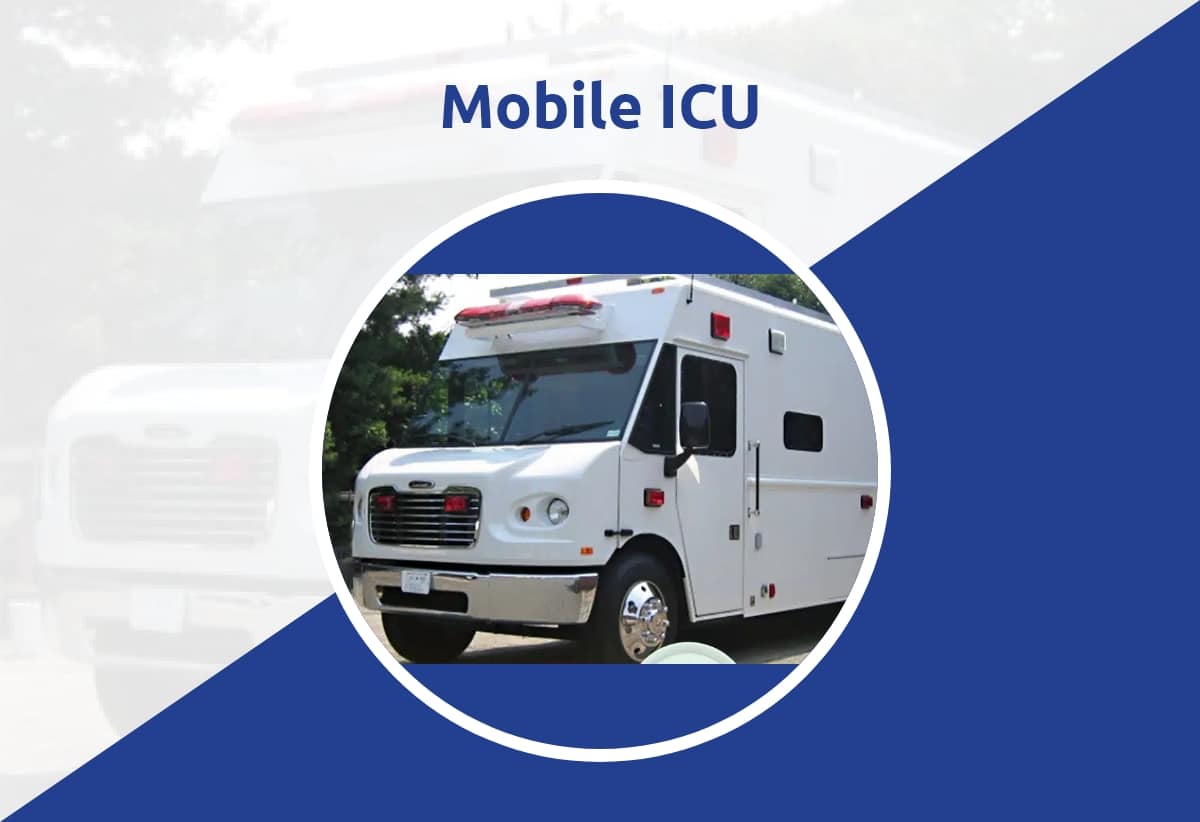Mobile ICU: An Evaluation of the Effectiveness of Critical Medical Care

The critical period, encompassing the first hour after a traumatic event or sudden illness, is often considered the most crucial for maximizing the chances of survival and recovery.
In situations where patients are too critically ill to be safely transported to traditional hospital Intensive Care Units (ICUs), Mobile Intensive Care Units (MICUs) play a vital role in bridging the gap and delivering life-saving care directly at the scene.
You may also like: Mobile Specialty Vehicles
But how effective are these mobile ICUs, and what are the key considerations surrounding their use?
Understanding Mobile ICUs: Equipped for the Road
A Mobile ICU, also known as a Mobile Critical Care Unit (MCCU) or a MICU ambulance, is essentially a fully equipped ICU on wheels. These specialized vehicles are staffed with highly trained critical care paramedics, nurses, and sometimes even physicians, depending on the specific configuration and local regulations.
They are equipped with advanced life support equipment often mirroring what’s found in a hospital ICU, including:
- Ventilators for mechanical breathing support
- Cardiac monitors to assess heart rhythm and function
- Defibrillators for restarting a stopped heart
- Blood monitoring devices
- Syringe pumps for delivering medications
- Advanced airway management tools
MICUs are typically dispatched in response to emergencies such as:
- Severe car accidents and other traumatic injuries
- Cardiac arrest and other heart emergencies
- Respiratory distress and severe breathing difficulties
- Sepsis and other life-threatening infections
- Stroke and other neurological emergencies
You may also like: EMS Vehicles for Emergency Medical Services
Benefits of Mobile ICU
In the high-stakes world of critical care, every second counts. For patients experiencing life-threatening emergencies outside a hospital setting, timeliness of access to specialized medical attention can be the difference between life and death. Here are the potential benefits of Mobile ICUs are listed below.
- Improved patient outcomes: By bringing critical care expertise closer to the patient, MICUs can potentially improve patient outcomes by reducing the time it takes to initiate life-saving interventions. This is particularly crucial for time-sensitive conditions like stroke, cardiac arrest, and major trauma.
- Expanded access to care: In rural areas or locations with limited access to specialized medical facilities, MICUs bridge the gap by providing advanced care to patients who might otherwise have difficulty reaching a hospital.
- Reduced hospital overcrowding: By intercepting critically ill patients and transporting them directly to a suitable medical facility, MICUs can help alleviate pressure on already-strained hospital resources.
- Enhanced disaster response: MICUs play a vital role in disaster response situations, providing critical care to a large number of casualties in a short period.
Evaluating Effectiveness: Mixed Findings
- While the potential benefits of MICUs appear promising, assessing their overall effectiveness presents a complex challenge.
- Research findings on the impact of MICUs on patient outcomes have been mixed, with some studies demonstrating positive effects, while others show little or inconclusive evidence.
- Studies have shown that patients transported by MICUs have lower mortality rates compared to those transported by standard ambulances, particularly for specific conditions like cardiac arrest and major trauma.
- MICUs can improve patient outcomes by providing early access to life-saving interventions, such as mechanical ventilation and blood product administration, which might not be readily available in standard ambulances.
- They can also optimize resource utilization by preventing unnecessary transports to hospitals when patients can be stabilized and treated effectively on-site.
Challenges and Concerns
- Cost-effectiveness: Equipping, staffing, and maintaining MICUs can be expensive, raising concerns about their cost-effectiveness compared to other emergency medical services.
- Limited evidence: Some studies have shown no significant difference in mortality rates between patients transported by MICUs and standard ambulances. This could be due to various factors, including variations in study design, patient populations, and healthcare systems.
- Ethical considerations: Decisions about utilizing MICUs need to consider the appropriate use of resources and weigh the potential benefits against the risks involved in transporting critically ill patients.
Overall, the effectiveness of MICUs appears to be context-dependent. While evidence suggests potential improvements in patient outcomes for specific situations, more research is needed to definitively assess their impact on a broader scale. Cost-effectiveness and ethical considerations also play a crucial role in determining the optimal use of these specialized resources.
You may also like: New Vs Used Mobile Medical Clinic Vehicle
Looking Ahead: The Future of Mobile Critical Care
The field of mobile critical care is constantly evolving. Advances in technology, such as telemedicine and portable medical devices, are opening up new possibilities for delivering even more sophisticated care in the pre-hospital setting. Ongoing research and improved data collection are crucial for better understanding the effectiveness of MICUs and optimizing their use in various healthcare settings.
Here are some key areas of future focus:
- Refining guidelines: Developing clearer guidelines and criteria for determining which patients would benefit most from MICU transport.
- Continuous improvement: Investing in ongoing research and evaluation to assess the impact of MICUs on patient outcomes and cost-effectiveness.
- Collaboration and coordination: Strengthening collaboration between pre-hospital and hospital care systems to ensure seamless transition and continuity of care for critically ill patients.
Conclusion
Mobile ICUs represent a significant advancement in emergency medical care, offering the potential to deliver critical care directly to patients in their time of need. While the current evidence on their effectiveness is mixed, ongoing research and continuous improvement efforts are crucial for optimizing their use and ensuring their value in the broader healthcare landscape.
In conclusion, Mobile ICUs represent a promising innovation in emergency medical care. While their effectiveness remains a subject of ongoing research, their potential to improve patient outcomes in specific situations is undeniable. As technology advances, healthcare systems evolve, and research continues, MICUs are poised to play a vital role in ensuring that even the most critically ill patients receive timely and effective care.
Choose excellence in critical care solutions with our mobile medical vehicles. Elevate patient outcomes and streamline healthcare delivery with our cutting-edge technology. To get further information regarding mobile ICU, mobile medical vehicle, mobile dental vehicle, refurbished medical equipment, please feel free to call us at +1 586 917 0245 or email us at sales@kbdentalconsulting.com.

 SUBSCRIBE TO OUR BLOG
SUBSCRIBE TO OUR BLOG
